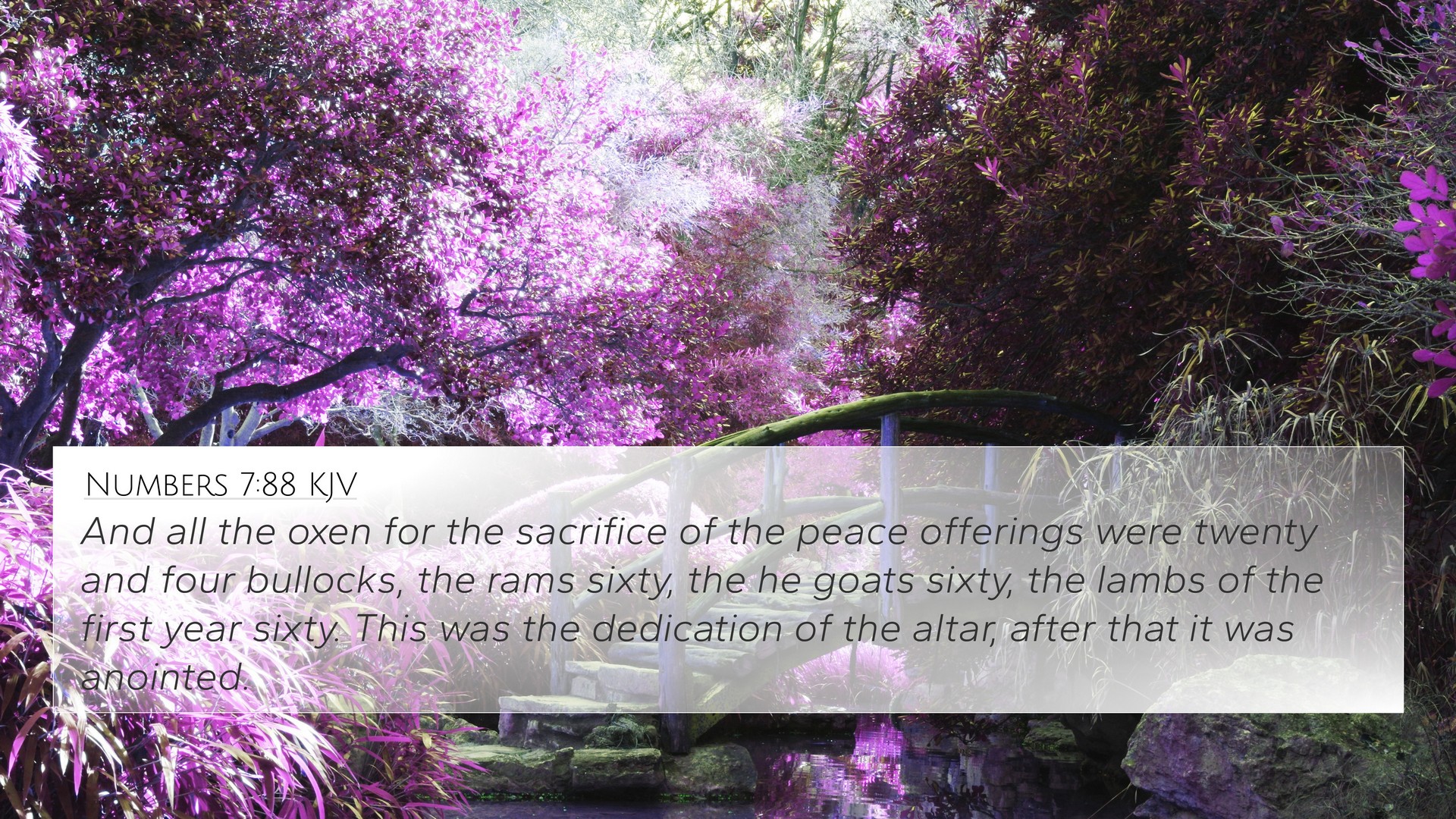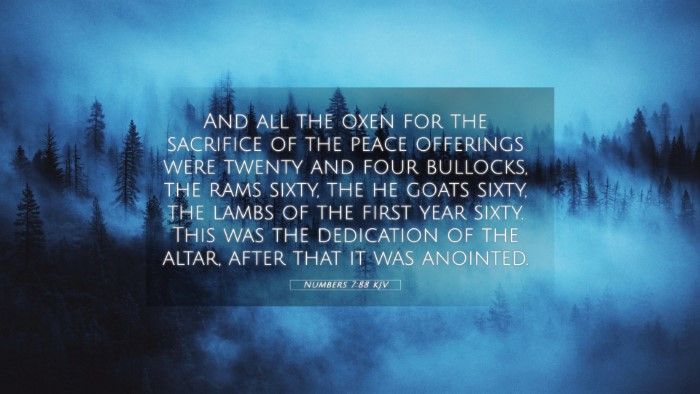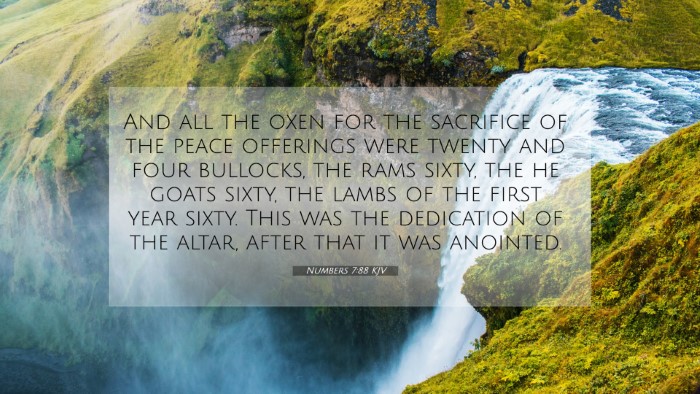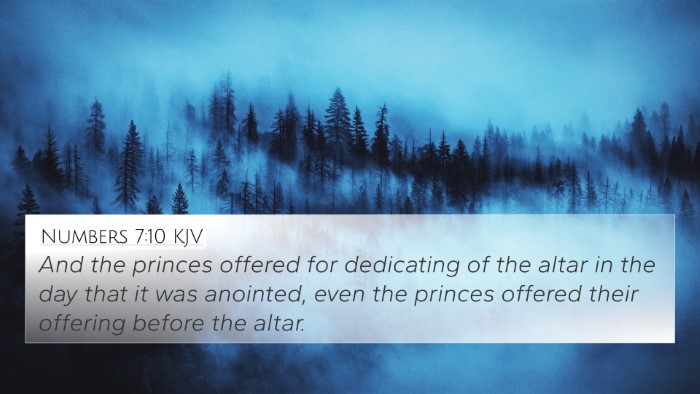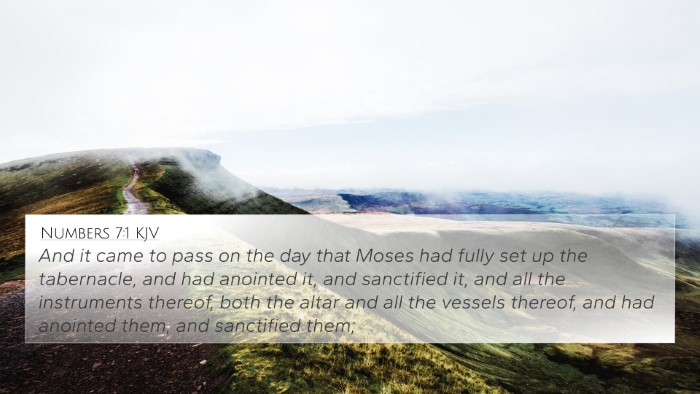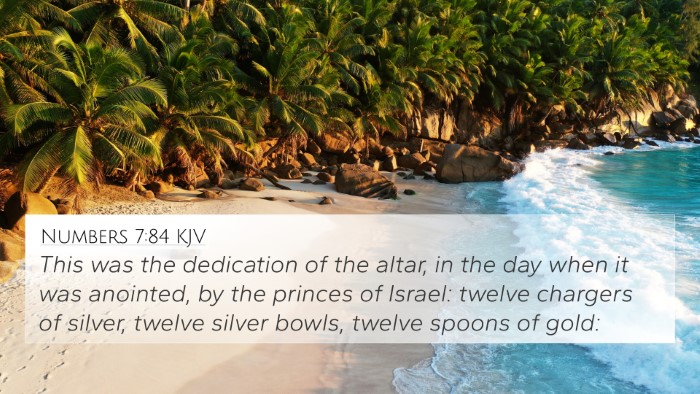Understanding Numbers 7:88
Verse Reference: Numbers 7:88
Verse Content: "And all the oxen for the sacrifice of the peace offerings were twenty and four bullocks, the ram's were sixty, and the goats were sixty." (Numbers 7:88)
Summary of Meaning
The verse from Numbers 7:88 highlights the offerings brought to the Tabernacle during the dedication of the sanctuary. It emphasizes the importance of sacrificial offerings in the worship practices of ancient Israel. The detailed account reflects God's instructions for worship, the significance of sacrifice, and the communal aspect of these offerings.
Insights from Public Domain Commentaries
-
Matthew Henry:
Henry notes that this verse correlates with the overall dedication of the tabernacle and the importance of sacrificial offerings in maintaining a relationship with God. The numerical specificity signifies the abundance of God's provision and the seriousness of their worship.
-
Albert Barnes:
Barnes emphasizes the symbolism behind the sacrifices mentioned, indicating that they represent peace between God and His people. The offerings also reflect the people's gratitude and acknowledgment of God’s blessings.
-
Adam Clarke:
Clarke discusses the ceremonial aspects of the offerings and explains how they signify the need for atonement and communion with God. He suggests that each offering carries specific meanings tied to the covenant relationship established with the Israelites.
Connections to Other Bible Verses
This verse can be linked to several biblical themes and passages. Here are some relevant cross-references that deepen the understanding of Numbers 7:88:
- Leviticus 1:3-9: Discusses the burnt offerings and their role in atonement.
- Hebrews 9:22: Highlights the significance of blood in purification and covenant.
- Exodus 29:38-42: Details the daily offerings that maintain the relationship between God and Israel.
- 1 Peter 2:5: Refers to believers as living stones, being built up as a spiritual house to offer spiritual sacrifices.
- Romans 12:1: Calls believers to present their bodies as living sacrifices, holy and pleasing to God.
- Psalm 51:17: Indicates that God desires a broken spirit and a contrite heart more than traditional sacrifices.
- John 3:16: The ultimate sacrifice of Christ as a fulfillment of God's covenant and promise for peace with humanity.
Thematic Connections
Understanding the themes within Numbers 7:88 requires examining the broader narrative of sacrifices and worship in the Old Testament:
- First Fruits and Gratitude: The offerings reflect the Israelites' gratitude for God's provision and protection.
- Communal Worship: The sacrifices indicated a collective acknowledgment of God's sovereignty among the Israelites.
- Divine Instruction and Obedience: The meticulous details of the offerings highlight the importance of following God’s commandments.
- Connection to Atonement: Each animal represents a key component of the sacrificial system aimed at reconciling humanity to God.
Tools for Bible Cross-Referencing
To delve deeper into biblical themes and their interconnectedness, one might utilize:
- Bible Concordance: A useful tool for finding cross-references and related verses based on keywords.
- Bible Cross-Reference Guide: Guides that provide thematic links between scriptures.
- Cross-Reference Bible Study: A method to systematically analyze verses that relate to specific themes or teachings.
- Comprehensive Bible Cross-Reference Materials: Resources that compile extensive references across the scriptures for detailed study.
- Bible Chain References: A technique to follow a theme through successive verses across the texts.
User Intent and Research Focus
For those exploring how specific verses connect, consider the following inquiries:
- What verses are related to Numbers 7:88?
- How do Hebrews 9:22 and Numbers 7:88 connect in terms of atonement?
- Find cross-references for peace offerings found in the Old Testament.
- How does Numbers 7:88 support the themes of gratitude and sacrifice discussed in Romans 12:1?
Conclusion
Numbers 7:88 serves as a poignant reminder of the sacrificial system in biblical worship and is deeply intertwined with themes of gratitude, atonement, and divine instruction. Exploring cross-references enriches understanding and reveals the continuity of God’s message throughout the scriptures. Engaging in a comparative Bible verse analysis allows believers to appreciate the depth and breadth of Biblical teachings on sacrifice and worship.
